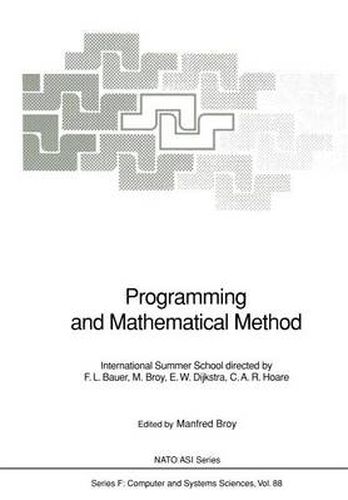Readings Newsletter
Become a Readings Member to make your shopping experience even easier.
Sign in or sign up for free!
You’re not far away from qualifying for FREE standard shipping within Australia
You’ve qualified for FREE standard shipping within Australia
The cart is loading…






This title is printed to order. This book may have been self-published. If so, we cannot guarantee the quality of the content. In the main most books will have gone through the editing process however some may not. We therefore suggest that you be aware of this before ordering this book. If in doubt check either the author or publisher’s details as we are unable to accept any returns unless they are faulty. Please contact us if you have any questions.
The Summer School in Marktoberdorf 1990 had as its overall theme the development of programs as an activity that can be carried out based on and supported by a mathematical method. In particular mathematical methods for the development of programs as parts of distributed systems were included. Mathematical programming methods are a very important topic for which a lot of research in recent years has been carried out. In the Marktoberdorf Summer School outstanding scientists lectured on mathematical programming methods. The lectures centred around logical and functional calculi for the * specification, * refinement, * verification of programs and program systems. Some extremely remarkable examples were given. Looking at these examples it becomes clear that proper research and teaching in the area of program methodology should always show its value by being applied at least to small examples or case studies. It is one of the problems of computing science that examples and case studies have to be short and small to be lJresentable in lectures and papers of moderate size. However, even small examples can tell a lot about the tractability and adequacy of methods and being able to treat small examples does at least prove that the method can be applied in modest ways. Furthermore it demonstrates to some extent the notational and calculational overhead of applying formal methods.
$9.00 standard shipping within Australia
FREE standard shipping within Australia for orders over $100.00
Express & International shipping calculated at checkout
This title is printed to order. This book may have been self-published. If so, we cannot guarantee the quality of the content. In the main most books will have gone through the editing process however some may not. We therefore suggest that you be aware of this before ordering this book. If in doubt check either the author or publisher’s details as we are unable to accept any returns unless they are faulty. Please contact us if you have any questions.
The Summer School in Marktoberdorf 1990 had as its overall theme the development of programs as an activity that can be carried out based on and supported by a mathematical method. In particular mathematical methods for the development of programs as parts of distributed systems were included. Mathematical programming methods are a very important topic for which a lot of research in recent years has been carried out. In the Marktoberdorf Summer School outstanding scientists lectured on mathematical programming methods. The lectures centred around logical and functional calculi for the * specification, * refinement, * verification of programs and program systems. Some extremely remarkable examples were given. Looking at these examples it becomes clear that proper research and teaching in the area of program methodology should always show its value by being applied at least to small examples or case studies. It is one of the problems of computing science that examples and case studies have to be short and small to be lJresentable in lectures and papers of moderate size. However, even small examples can tell a lot about the tractability and adequacy of methods and being able to treat small examples does at least prove that the method can be applied in modest ways. Furthermore it demonstrates to some extent the notational and calculational overhead of applying formal methods.